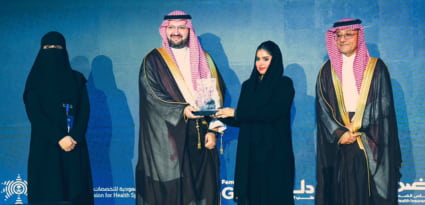
Three JHAH family medicine physicians scoop national awards
Family medicine consultant and two family medicine residents recognized as leaders in the field in Saudi Arabia.
Three family medicine physicians at Johns Hopkins Aramco Healthcare (JHAH) have won national awards to recognize their outstanding contributions to the field.
Dr. Amal Al Garni, family medicine consultant at JHAH, won Consultant of the Year at an event hosted by the Saudi Society of Family and Community Medicine.
At the same event, Dr. Fajer Al Dulaijan and Dr. Sara Al Ali collected two of the three available Resident of the Year awards.
The awards were presented by His Royal Highness Prince Abdulaziz bin Talal bin Abdulaziz Al Saud.
Dr. Mohammed Mohammed, Chair of Primary Care Services at JHAH, said:
All three awards are testament to the exceptional dedication, expertise, and contributions that each of these clinicians have made to our field. These prestigious awards are not only personal milestones but cause for immense pride in our department.
Dr. Al Garni was recognized for her outstanding contributions to patient care and mentorship, and her role in advancing family medicine in Saudi Arabia. The judging criteria for the Resident of the Year awards included academic performance, research work, leadership experience, and volunteering activities.
There are around 2,000 family medicine residents working across 46 training programs in Saudi Arabia, according to the Saudi Board for Family Medicine.
Dr. Mohammed said: “The fact that JHAH residents took home two of the three Resident of the Year awards is testament to the strength of our Family Medicine Residency Program.”
JHAH is one of the leading family medicine training hubs in Saudi Arabia. Its Family Medicine Residency Program welcomes up to 20 new residents each year, making it one of the largest programs of its kind in the Kingdom.
The 2024 class of the JHAH Family Medicine Residency Program posted a 100% pass rate for their final examinations, marking the first time a perfect pass rate has been achieved.
JHAH is accredited by the Saudi Commission for Health Specialties to offer more than 21 residency programs, including Pathology, Pharmacy, Emergency Services, Anesthesia, Psychiatry, Internal Medicine, Pediatrics, and Family Medicine.
All JHAH residency programs aim to produce healthcare innovators who drive reform in line with Vision 2030, by combining academic excellence with forward-looking clinical practice standards, global knowledge exchange, and leadership training.
The Saudi Society of Family and Community Medicine awards were presented at an event in May.
